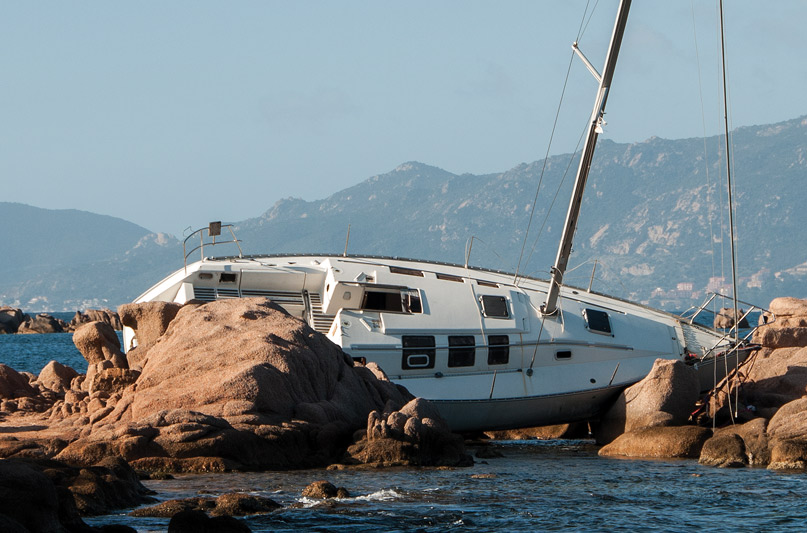
“There are worse things in life than death. Have you ever spent an evening with an insurance salesman?”
—Woody Allen
Mention the “Gig Harbor Fire” and most local boaters will know exactly what you’re talking about. The sun was about to rise at 0700 hours on a seemingly unremarkable August 31 morning in 2005 when the first witnesses reported black smoke and flames coming from the marina. The raging fire grew rapidly, exploding propane tanks, tearing down whole buildings, and destroying 50 boats as liveaboards and marina management fled for their lives. Miraculously, nobody was hurt.
As the damage bill ran into the millions, boat owners dusted off their insurance policies and prepared to piece together their lives. It was only then when some learned that the “salvage and wreck removal” clause of their policy only provided 5% of the hull’s estimated value in coverage.
This kind of story can feel like the norm to boaters who go cross-eyed when confronted with the fine print of their insurance policies. However, the difference between the policy that has you covered in that worst-case scenario and one that leaves you high and dry is in the details.
In our effort to detangle the world of boat insurance, we turn to Chris Gibbon, a local boat insurance broker with over 24 years of experience. A Bayliner 4788 owner with a competitive sailing resume, Gibbon has a few nuggets of wisdom for those of us hunting for the right policy.
Q: You’re in a kind of niche market with boat insurance. Are there nuances or differences with boat insurances vs. other kinds of insurance?
Most of the policies are similar, but there are differences between them. Some things jump out. For example, you have to worry about muskrat damage. Stuff like that is outlined in the list of exclusions.
Q: Can you go into exclusions and the consequential damages clause a bit? What is it and how does it work?
The consequential damages clause is basically a sentence at the end of the list of exclusions that reads, “However we will cover the consequential property damage resulting from any fire, sinking, submersion, de-masting, collision, stranding…”
Fournier Insurance Solutions is an insurance company based in the South Sound with five locations in Western Washington (University Place, Gig Harbor, Chehalis, Montesano, and Bremerton). The company was founded in 1977 by Dick Fournier in Montesano, Washington, and not only covers boat insurance, but personal, business, life, and other industry specialized insurance.
Q: That sounds like a pretty important sentence to hone in on as a potential client, especially for boaters looking for a good insurance policy.
Absolutely. You don’t want a policy that’s patchy and doesn’t cover the kind of damages you’d realistically encounter on your boat. It’s also good to note that there is a difference between boat policies and yacht policies.
Q: Can you go into that a little bit?
Well, the industry standard is to set the length for a yacht at 26’ length overall. So, generally, vessels less than 26’ are boats and over 26’ are yachts in the marine insurance sphere. As you get into the yacht category, big complicated boats with electrical systems, mechanical systems, etc., you need a policy that properly addresses the increased needs. There’s also broader coverage in this category vs. more basic trailerable runabouts.
Q: Are there any red flags that readers and boaters should be aware of when comparing insurance policies? How do you know if you’re getting stiffed?
Read the list of exclusions and understand it. Read the navigational limits and be sure of what you’re buying.
Q: Can you go into those navigational limits clause a bit? How do they work?
Most carriers will cover the entire West Coast, and some will even throw in Mexico if you need something that broad. Frankly, in my experience, most boaters based in Puget Sound only need Puget Sound and maybe up to the tip of Vancouver Island covered.
Q: Is it cheaper to do it that way?
Not generally, no. Plenty of policies will include Southeast Alaska at no charge. It’s just important to know what you’re buying for your own protection. If you do need more area of coverage, be sure to get insurance that will protect you.
Q: Navigation doesn’t sound like a big factor with cost of a policy then. What does tend to bump up the cost?
There’s only a few things that really drive the cost of a policy: the value of the boat and the age of the boat. Those are the two biggest factors.
Q: With the age of boats, do policies factor in regular maintenance at all or no?
Nope. Insurance companies usually will require a survey, but the cost goes up with age. Adhering to the market average of five years between surveys qualifies many owners of older boats. Sometimes that will help offset the cost of an older boat.
There’s other discounts available as well. Being a part of a yacht club, cruising club, accident-free; having Coast Guard training, or taking captain’s courses. A captain’s license for the ambitious is a big one.
Q: Is there anything about the Pacific Northwest that affects boating insurance?
We don’t have the big storms that boaters around the country generally have to worry about. Insurers have started to get pretty aggressive around here with Pacific Northwest boaters thanks to the lack of storms, sometimes translating into lower insurance costs. What we have to worry about here is logs and rocks. Those are the most common causes of boat damage in the Pacific Northwest in my experience.
I’ve never seen a policy that doesn’t cover that kind of thing. It [hitting a submerged object coverage] is pretty standard. Study the list of exclusions closely and read the policy. Also, really trusting your insurance broker can really pay off.
Q: In your experience, are people usually pretty close to their insurance broker?
Not always, no. You get all types. Some of my clients have been with me for years and some are one-and-done types.
Q: What’s the road to insurance usually look like for a new boat owner? Imagine a guy with his new boat and he needs insurance. Now what?
Go to me! (laughs)
Do some research and start reaching out to established people. Some carriers will demand he has captain’s training and all sorts of things. The boat owner will fill out an insurance application where these hurdles will be addressed. One step that often becomes necessary is a survey. Usually boats 10 to 15 years and newer can get that survey requirement waived.
 Chris Gibbon has been a marine insurer for 24 years, although the journey to be an insurance broker was hardly a straight one. Gibbon studied graphic and industrial design at Kent State in his native Ohio. An avid sailor and boater, Gibbon was a regular on the local and international racing circuits for years.
Chris Gibbon has been a marine insurer for 24 years, although the journey to be an insurance broker was hardly a straight one. Gibbon studied graphic and industrial design at Kent State in his native Ohio. An avid sailor and boater, Gibbon was a regular on the local and international racing circuits for years.
Q: Once you’re working with a client, what are you generally doing behind the scenes to get him or her a good deal?
Negotiating with the underwriters is a big part of it. Having long-term relationships with the underwriters goes a long way with what I do. I’m on a first-name basis with the underwriters I work with and have been doing business with them for years. Whoever boaters choose for their insurer, having good insurer and underwriter relationships definitely helps when getting a good deal.
Q: Shifting gears a bit, one source of boat damage I’ve heard you address before is muskrat damage. How much damage can these critters really do?
They can do catastrophic damage to a boat. Muskrats will go up the exhaust and chew a hole in the hose, and typically sink the boat. I just had a client the other day come in after a muskrat did exactly that. I don’t know how that boat didn’t sink and the muskrat did about $3,500 worth of damage. He was extremely lucky, those things usually do much more damage.
I have a couple examples of exhausts that have been destroyed by muskrats. It’s pretty amazing.
Q: Anything else the Northwest boater should be aware of? What about damages from fouled crab pots?
With crab pots, the issue is usually solved with a diver cutting the fouled line. Usually they’re fine. Once I had a client who sucked up a commercial crab pot on accident, and the thing punched a hole in his boat. That was the worst-case scenario.
Q: Let’s say you’re a boater on a budget, and you just want to get out there. Is liability insurance your best friend?
Yep, you can do just strict liability insurance to get by. Just about all marinas require liability insurance, generally more than $300,000. Increasingly, marinas want at least $500,000 liability insurance coverage minimum. A fair number of yacht clubs are going up to a million.
With liability insurance, it’s not about covering your own boat, but the damages you can cause. It’s enough to satisfy the marina’s requirement and I suppose it’s better than nothing. The guy whose got an older 27’ sailboat that’s worth a few grand may not think it’s worth it to pay $700 a year to insure it.
Q: Does liability insurance cover a situation where the boat goes sinks in a channel and incurs a lot of costs related to getting it out of there?
That leads into another portion of a coverage; salvage and wreck removal. It’s important to read that part of your policy. Most policies will cover salvage cost equal to your hull value, for example, if your boat is valued at $100,000 and you’ll get that much salvage coverage.
But, again, it’s important to read that policy. When the Gig Harbor Fire happened in 2005, a lot of people used the same carrier and that company only provided 5% of your hull value for salvage. That ruined a lot of people’s day as they were not adequately covered with their policies.
Q: What was your takeaway from that disaster from an insurer’s perspective? Were there some lessons learned the hard way?
There were a lot of lessons learned from the way in which they managed the rebuilt marina to the individual boater’s insurance policy choices. It was an old marina and, contrary to some people’s beliefs, fiberglass burns really well.
Q: With incidents like that fire, do you have a detective role to play in figuring out what exactly happened, or is that outside the realm of what you do?
I don’t get into that stuff, although it certainly effects how whatever company I work with does business. But no, that’s outside of my role as an insurance broker. Our job is to sell insurance policies and help boaters maintain them.
I’d say that boaters would be better served to work with boat insurers who specialize in this world. That’s my recommendation to boaters, to seek out insurers in the boating world who know what to look out for.